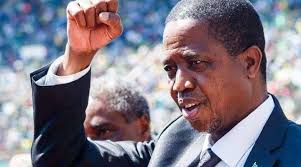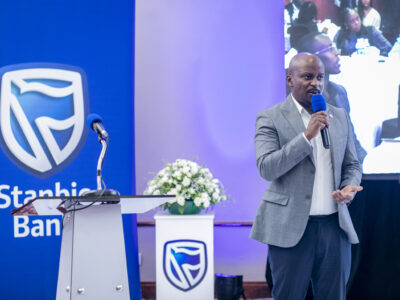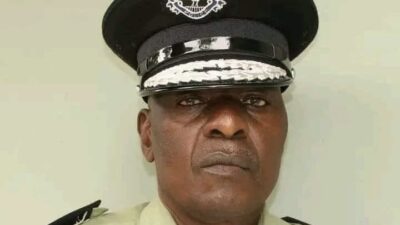The Constitutional Court of Zambia stands on the verge of delivering a ruling that could either cement or shatter Edgar Chagwa Lungu’s political ambitions.
Today, December 10, 2024, the court will decide whether the former president can run in the 2026 general elections—a decision that could redefine Zambia’s understanding of presidential term limits and test the resilience of its legal system.
Lungu, who served as Zambia’s sixth Republican President, finds himself at the center of a constitutional storm, yet again.
This marks the fifth time his eligibility has come under scrutiny, despite earlier rulings by the same court affirming his right to contest.
But with new legal challenges and a growing public spotlight, this case has evolved into a high-stakes battle over law, legacy, and political power.
The core of the debate: A President or a Precedent?
The heart of the legal wrangling lies in the complex interplay between the repealed 1991 Constitution and the 2016 constitutional amendments.
Youth activist Michelo Chizombe argues that Lungu’s stint from 2015 to 2016—after succeeding the late President Michael Sata—should count as a full term, disqualifying him under Zambia’s two-term limit.
Lungu’s legal team led by Makebi Zulu Advocates, however, maintains that this matter has already been settled.
The court ruled in 2018 and 2021 that his first term didn’t qualify as “full,” allowing him to seek re-election.
But Chizombe contends that earlier rulings overlooked key transitional provisions in the 2016 amendments.
His argument frames this as not just a technical oversight but a critical breach of constitutional principles.
Political Turmoil in the Patriotic Front
Following his crushing defeat in the 2021 elections, Lungu announced his retirement from active politics, stepping aside as Hakainde Hichilema took office with 2,810,757 votes, leaving Lungu with 1,814,201.
However, what seemed like a quiet exit quickly spiraled into a political crisis within the Patriotic Front (PF).
Lungu’s absence created a leadership vacuum, prompting the resignation of key party figures, including Secretary-General Davies Mwila.
This power gap opened the door for Matero Member of Parliament (MP) Miles Sampa, who controversially organized a general conference at Mulungushi International Conference Centre.
Amid accusations of government interference, Sampa was elected party president, intensifying divisions within the PF.
The conflict deepened when Sampa appointed Morgan Ng’ona as Secretary-General, sparking further discord and raising questions about Sampa’s control over the party.
The situation escalated as MP Robert Chabinga of Mafinga publicly backed Sampa, fuelling the factional rift.
Chabinga’s involvement eventually led to his elevation as acting party president after Sampa’s alleged expulsion in July 2023.
As tensions continued, Chabinga expelled several key figures, including Lungu and Given Lubinda, accusing them of indiscipline.
However, Sampa reconciled with Lungu in early 2024, taking Chabinga and Ng’ona to court over the legitimacy of his presidential appointment.
The ongoing legal dispute underscores the deep divisions within the PF.
Return to Politics and Legal Fallout
In a dramatic turn, Lungu returned to politics in October 2023, vowing to “save the PF” and defend democracy.
He claimed that his rights, and those of his family and party members, had been violated by government actions.
Lungu’s return triggered immediate consequences, including the revocation of his retirement benefits by the Zambian government, which cited a law stripping such privileges from former presidents who re-enter politics.
Government spokesperson, Cornelius Mweetwa, stated: “The law is clear.
Former presidents who return to politics lose their benefits.”
Despite this, Lungu remained defiant.
In an explosive BBC interview, he accused the government of effectively placing him under house arrest, claiming he was unable to move freely without police interference.
“I can’t step outside without being intercepted by the police and driven back home. I’m prepared to face the consequences of re-entering politics,” Lungu said during the interview.
Police insisted their actions were for Lungu’s safety, while President Hichilema reassured the public that Lungu was free to move about, but warned that he would lose his benefits if he persisted in political activities.
“My brother ECL is free. If anyone is interfering with him, I’ll be the first to protect him. All we are doing is following the law,” Hichilema remarked at a press briefing.
The situation worsened when police raided Lungu’s Ibex Hill home in May 2023, searching for stolen motor vehicles and property allegedly taken by former First Lady Esther Lungu.
Lungu’s lawyer,Zulu, called the raid unconstitutional, further escalating the political tensions.
Lungu fiercely criticized the government, accusing it of using state institutions to silence dissent and suppress opposition.
Meanwhile, his wife, Esther, and their children faced arrest on corruption charges, complicating the already volatile situation.
Amid the turmoil, political activist Chizombe filed a petition with the Constitutional Court, challenging Lungu’s eligibility to run for president again, citing his two-term limit in office.
A Court Under Pressure
This case is no ordinary legal challenge. It pits Zambia’s judiciary against itself, with the public watching closely to see if the Constitutional Court will uphold its past decisions or choose to chart a new course.
Lungu’s lawyers argue that the principle of res judicata—finality in legal disputes—should protect him from what they describe as judicial harassment.
But Chizombe’s camp, led by lawyer Michael Moono, insists that the petition raises fresh questions that were never properly addressed.
Solicitor General Marshal Muchende has also weighed in, suggesting the case presents new legal dimensions worthy of reconsideration.
Adding to the drama, Lungu’s attempt to disqualify three judges from hearing the case—citing perceived bias—was flatly rejected.
Justice Margaret Munalula called the move a “manipulative tactic” designed to disrupt the bench’s independence.
Her colleagues, Justices Arnold Shilimi and Maria Kawimbe, dismissed the claims as baseless and damaging to public trust in the judiciary.
Complicating matters further, three Constitutional Court judges—Annie Sitali, Mugeni Mulenga, and Palan Mulonda—were suspended for alleged misconduct just days before the hearing.
These judges had previously backed Lungu in 2021, fueling speculation about political interference.
The Stakes: More Than Lungu’s Future
At its core, this case is about more than Lungu’s eligibility.
It has become a referendum on Zambia’s democratic institutions, raising profound questions about judicial accountability, constitutional interpretation, and the separation of powers.
Constitutional lawyer John Sangwa, acting as amicus curiae, has warned that revisiting Lungu’s eligibility could retroactively undermine the legitimacy of the 2021 elections, where Lungu’s candidacy was a key factor.
If the court disqualifies him now, does that call into question the integrity of Zambia’s electoral process?
Conversely, if the court once again affirms Lungu’s eligibility, it risks setting a precedent that some argue could weaken constitutional safeguards against political overreach.
What’s at Stake for Zambia?
The outcome of this case will ripple far beyond the political ambitions of one man. It will test the judiciary’s ability to balance legal consistency with evolving interpretations of the Constitution. It will challenge Zambia’s commitment to democratic principles and the rule of law.
And for Lungu, it could be the ultimate reckoning—a final chance to return to the political stage or a definitive end to his presidential journey.
In deciding his fate, the Constitutional Court is also deciding its own legacy.
Will it defend its earlier rulings and assert the permanence of legal precedent, or will it risk rewriting the script to address new challenges? Either way, the ruling will leave an indelible mark on Zambia’s political landscape, with the eyes of the nation—and the world—fixed on Lusaka.
WARNING! All rights reserved. This material, and other digital content on this website, may not be reproduced, published, broadcast, rewritten or redistributed in whole or in part without prior express permission from ZAMBIA MONITOR.












Comments